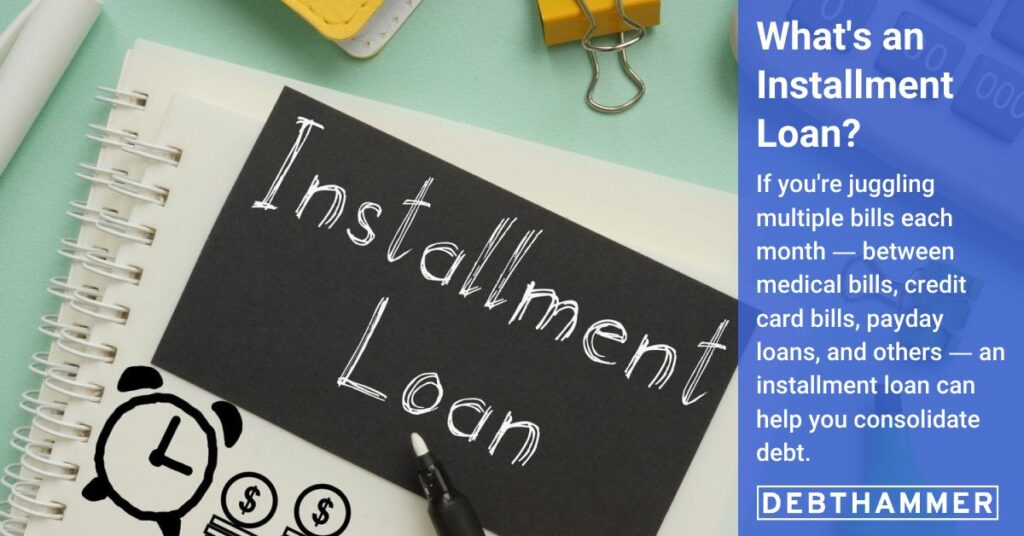If you’re juggling multiple bills each month — between medical bills, title loans, credit card bills, payday loans, and others — it can be hard on your checking account. Especially if you’re short on cash and the many payments are racking up overdraft fees or late fees.
It might be time to consider rolling your debts into one installment loan.
Table of Contents
Our take
- An installment loan allows you to borrow a certain amount of money in a lump sum
- It is repaid in a fixed number of monthly installments
- The installments can be a fixed monthly payment if your interest rate is fixed or can vary from month to month if you have a variable interest rate
What is an installment loan?
No two loans are alike when it comes down to having to borrow money and take out a loan be it for a new home, a car, or any other major purchase.
For instance, an installment loan is a loan that allows you to borrow a certain amount of money all at once.
This type of loan is repaid over a fixed number of payments, also known as installments.
Some installment loans have fixed payment amounts, which means the amount never changes during the life of the loan. With others, you might have a variable interest rate that could differ over time, meaning your payment amount could vary monthly.
Unlike with revolving credit such as credit cards or a line of credit, you must decide the exact amount of money required as a lump sum before you complete a loan application.
While loan payments are usually monthly, this can sometimes vary. You’ll need to check with the lender or financial institution to know. The loan term is the time a borrower must repay a loan.
If you’re considering debt consolidation, an installment loan could be an excellent way to help you get your finances under control.
Common types of installment loans
There are several types of installment loans such as auto loans, mortgage loans, personal loans, and student loans. Here’s the breakdown and brief description of each example:
Auto loans
Auto loans are repaid in monthly installments and can range from 12 to 96 months but may vary depending on the lender you choose. Loans with longer terms sometimes have lower monthly payments and higher interest rates. However, if you take out longer terms, in the end, you will be paying more over the course of the payments.
Mortgages
A mortgage loan is another installment loan used to borrow money when purchasing a new house. In general, mortgages are typically repaid between 15-to-30-year terms with monthly payments. Some mortgages have fixed interest rates, meaning they don’t change over the life of the loan. The standard monthly principal and interest payments won’t typically change either, though your monthly payment can vary due to other escrow costs like taxes and insurance.
Student loan
Student loans are used to pay for college and other forms of higher education and are available via the U.S. Department of Education and various private lenders. Considered an unsecured loan, your tax returns can be garnished to pay any unpaid student loans in the future.
Personal loan
Personal loan installment loans may be used for things like consolidating debt, paying off large medical bills or covering unexpected expenses. Personal installment loans usually offer terms between 12 and 96 months. Note: these types of loans often carry higher interest rates than others, and personal loans don’t usually require collateral like a car or house. These loans come with regular monthly payments until you pay off your loan.
Unfortunately, installment loans can have their downsides, too.
For instance, once you take out the loan, you can’t add to the amount you need to borrow like you can with a credit card or line of credit. You will need to take out a new loan to borrow more funds.
Installment loans have a large monthly payment, but the lender could attach other fees and penalties. When you apply for an installment loan, you may also be asked to pay the origination fee, which is also the application fee. The lender will perform a credit check, so make sure your credit reports are free of errors that could push down your credit score.
Also, in some cases, prepayment penalties may require you to pay another fee when paying the loan off early.
Secured vs. unsecured loans — what’s the difference?
There are two distinct kinds of installment loans: secured loans and unsecured loans.
A secured loan requires the borrower to give collateral, whereas an unsecured loan does not.
This difference can affect the interest rate you will pay, the amount to be borrowed and any repayment terms.
Secured loan
Secured loans are typically protected by an asset and the item purchased, this could be your house or vehicle both of which can be used as collateral. Eligibility is usually simpler because you have something of value to offer in case you default on the loan.
Once you decide on the collateral you will offer, the lender maintains the deed or title until the loan is paid off.
Other collateral that can be presented to the lender may include stocks, bonds, or individual property.
Overall, secured loans are among the most popular ways to borrow large amounts of money, with the promise that the loan will be repaid.
Most experts suggest offering your home as collateral is the safest way to show you can repay the loan.
Additionally, secured loans can be home equity loans or home equity lines of credit (HELOC). These are determined by the current value of your home minus the amount owing. These loans use your home as collateral.
If you’ve been making mortgage payments for several years, it might be a good time to consider refinancing. This allows you to extend the remaining years on your mortgage and use some of your home’s equity to repay your debts. Because mortgage interest rates are particularly low, your monthly mortgage payment may decrease.
Unsecured loan
Unsecured loans are the reverse of secured loans. They can include things like credit cards, student loans, or personal (signature) loans, sometimes known as “good faith” loan rates, which can be higher.
When you take out an unsecured loan, a lender will base this on what is known in the industry as the five Cs of credit:
- Character: May include credit score, employment history, and other references
- Capacity: The income and the current debt you have
- Capital: The funds you have in savings or investment accounts
- Collateral: Those personal assets, like a home or vehicle, are offered as collateral
- Conditions: The overall terms of the loan be awarded
Pros and cons of installment loans
Using installment loans for debt consolidation has several advantages, but there are also a few disadvantages.
Pros
- Installment loans can help you pay for big purchases
- They have a set payment amount thanks to fixed interest rates
- You can usually save interest charges by paying the loan off early (as long as there’s no prepayment penalty in your loan agreement)
- The loans can provide the peace of mind of knowing when your debt will be paid off
Cons
- The fees and annual percentage rates can be higher than other loans
- Late or missed payments will hurt your credit score
- The loans create the potential to borrow — and then spend — more than you need
- Borrowers are locked into a long-term financial obligation
- It isn’t possible to adjust the loan amount down the road if you need more money like you could with a credit card or line of credit
- To qualify, you’ll need to have relatively good credit
Installment loan vs. payday loan — which is better?
If you need money to cover an expense, installment and payday loans are two options.
A payday loan, also sometimes called a cash advance loan, is a short-term loan you repay the next time you get paid by your employer. The repayment term for payday loans is within two to four weeks. It is best only for immediate financial needs.
You may get approved the same day you apply, which usually matters if you have bad credit. The money will be in your bank account almost immediately, by the next business day at the latest. A payday loan is good if you need quick cash to cover expenses until your next paycheck.
Before taking out any payday loan, know the terms and interest rates. Some payday loans include APRs over 600%.
There are differences between installment loans and payday loans, such as:
Loan amounts
Installment loans can fall into the thousands of dollars range, while payday loans are usually only a few $100.
Repayment times
You may have several months or even years to repay an installment loan with fixed monthly payments. If you choose a payday loan, it must be repaid quickly once you get your next paycheck.
Loan APRs
In most cases, installment loans have lower interest rates or fees than payday loans. Payday loans’ annual percentage rates (APR) can range in three digits.
Credit checks
Many lenders who offer installment loans check credit before any approvals. Payday lenders sometimes check credit for payment approval, but those credit requirements are usually lower than an installment loan.
Should I get an installment loan or payday loan?
Before you decide what kind of loan you need, it’s essential to understand the different loan products.
A payday loan is a good option if you need a small amount of cash and know you can repay the loan by your next paycheck.
If you are unable to repay a payday loan or want to borrow a more significant sum of money, an installment loan may be the better option for you.
How to apply for an installment loan
Before you start the application process, research various online and brick-and-mortar lenders. Check with your financial institutions and credit unions for better deals.
Check your credit reports with all three major credit bureaus — Experian, TransUnion and Equifax — and know your FICO score. Some lenders will have a minimum score for eligibility. You can get copies of your credit reports for free at annualcreditreport.com.
Once you have all this information, you’ll be better prepared to handle the application process.
Online installment loan options
There can be an overwhelming number of installment loan options online. Here are a few top loan offers for applicants with less-than-perfect credit scores.

Upstart
Upstart offers loans ranging from $1,000 to $50,000. Interest rates range from 7.8% to 35.99%. You can take up to five years to repay.

Lightstream
Lightstream offers loans with a maximum APR of 25.99% (with autopay). You can take up to seven years to repay the loan. The maximum loan amount is $100,000.

Upgrade
Upgrade personal loans have APRs ranging from 8.49% to 35.99%, plus an origination fee of 1.85% to 9.99%. The maximum loan amount is $50,000.
Will an installment loan affect your credit score?
Yes. Your credit score will increase if you make on-time payments. But beware: it would reduce your score if you make late payments or default. And when you pay off your loan, it could cause a temporary decrease in your score because the account will be considered closed and it will shorten your average credit age.
The bottom line
If you’re considering an installment loan, make sure you know the upfront terms and conditions of the loan you’re putting your signature and promise beforehand.
If you truly understand what’s being offered, do your homework and research where you can go for the best installment loan for your situation, installment loans can be an inexpensive and uncomplicated way to improve your financial situation and get out of debt for good.


